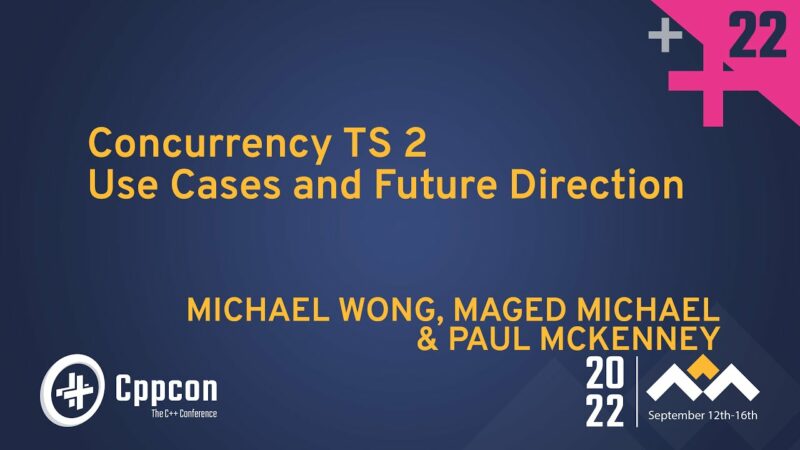https://cppcon.org/
---
C++ Concurrency TS 2 Use Cases and Future Direction - Michael Wong, Maged Michael, Paul McKenney - CppCon 2022
https://github.com/CppCon/CppCon2022
C++ Concurrency TS 2 has been approved, and is now accumulating content. It already contains two major sections covering hazard pointers and RCU. Because hazard pointers and RCU both have a long and rich history of implementation and use, minimal versions of both are also being proposed for inclusion in C++26. Both RCU and hazard pointers have more advanced features but they are confined to TS 2, and independent reference implementations of these advanced features are in progress. This talk will focus on additional use cases for RCU and hazard pointer and potential additions to TS 2.
Potential TS 2 additions include asymmetric fences, snapshot_ptr (also known as latest or cell), concurrent counters, concurrent queues, and synchronized <T>. TS 2 might therefore include concurrent data structures as well as the existing hazard pointers and RCU safe/deferred-reclamation techniques.
Next, we will describe hazard pointers can be used to replace slow and contended code (e.g., using shared_mutex and shared_ptr) to equivalent fast and scalable code using Concurrency TS 2 support.
Last, but hopefully not least, we will describe the phased-state-change RCU use case that can be used to create synchronization primitives that have RCU-reader-like overhead on fast paths. Of course, there is no free lunch in concurrency, so this also means that slow paths have RCU-grace-period-like latencies. This use case will be illustrated with a fast-readers reader-writer lock.
---
Michael Wong
Michael Wong is a Distinguished Engineer at Codeplay Software, a Scottish company that produces compilers, debuggers, runtimes, testing systems, and other specialized tools to aid software development for heterogeneous systems, accelerators, and special purpose processor architectures, including GPUs and DSPs. For twenty years, he was the Senior Technical Strategy Architect for IBM compilers. Michael is also Chair of the Khronos C++ Heterogeneous Programming language SYCL, Editor for the Concurrency TS and the Transactional Memory TS, Canadian Head of Delegation to the ISO C++ Standard, Founding member of the ISO C++ Directions group, Director and VP of ISOCPP.org and Chair of al Programming Languages for Canada’s Standard Councils.
---
Maged Michael
Maged Michael is a software engineer at Meta Platforms (Facebook). He is the inventor of hazard pointers, lock-free malloc and several algorithms for concurrent data structures. He received a Ph.D. in computer science from the University of Rochester. He is an ACM Distinguished Scientist. He is an elected member of the Connecticut Academy of Science and Engineering. He received the 2014 ACM SIGPLAN Most Influential PLDI Paper Award for his paper on Scalable Lock-Free Dynamic Memory Allocation and the 2022 Dijkstra Prize for his 2004 paper "Safe Memory Reclamation for Dynamic Lock-Free Objects Using Atomic Reads and Writes".
---
Paul McKenney
Paul E. McKenney has been coding for almost four decades, more than half of that on parallel hardware, where his work has earned him a reputation among some as a flaming heretic. Paul is at Meta Platforms (Facebook), where he maintains the RCU implementation within the Linux kernel, where the variety of workloads present highly entertaining performance, scalability, real-time response, and energy-efficiency challenges. Paul was previously an IBM Distinguished Engineer at the IBM Linux Technology Center. Prior to that, he worked on the DYNIX/ptx kernel at Sequent, and prior to that on packet-radio and Internet protocols (but long before it was polite to mention Internet at cocktail parties), system administration, business applications, and real-time systems. His hobbies include what passes for running at his age along with the usual house-wife-and-kids habit.
---
Videos Filmed & Edited by Bash Films: http://www.BashFilms.com
YouTube Channel Managed by Digital Medium Ltd https://events.digital-medium.co.uk


